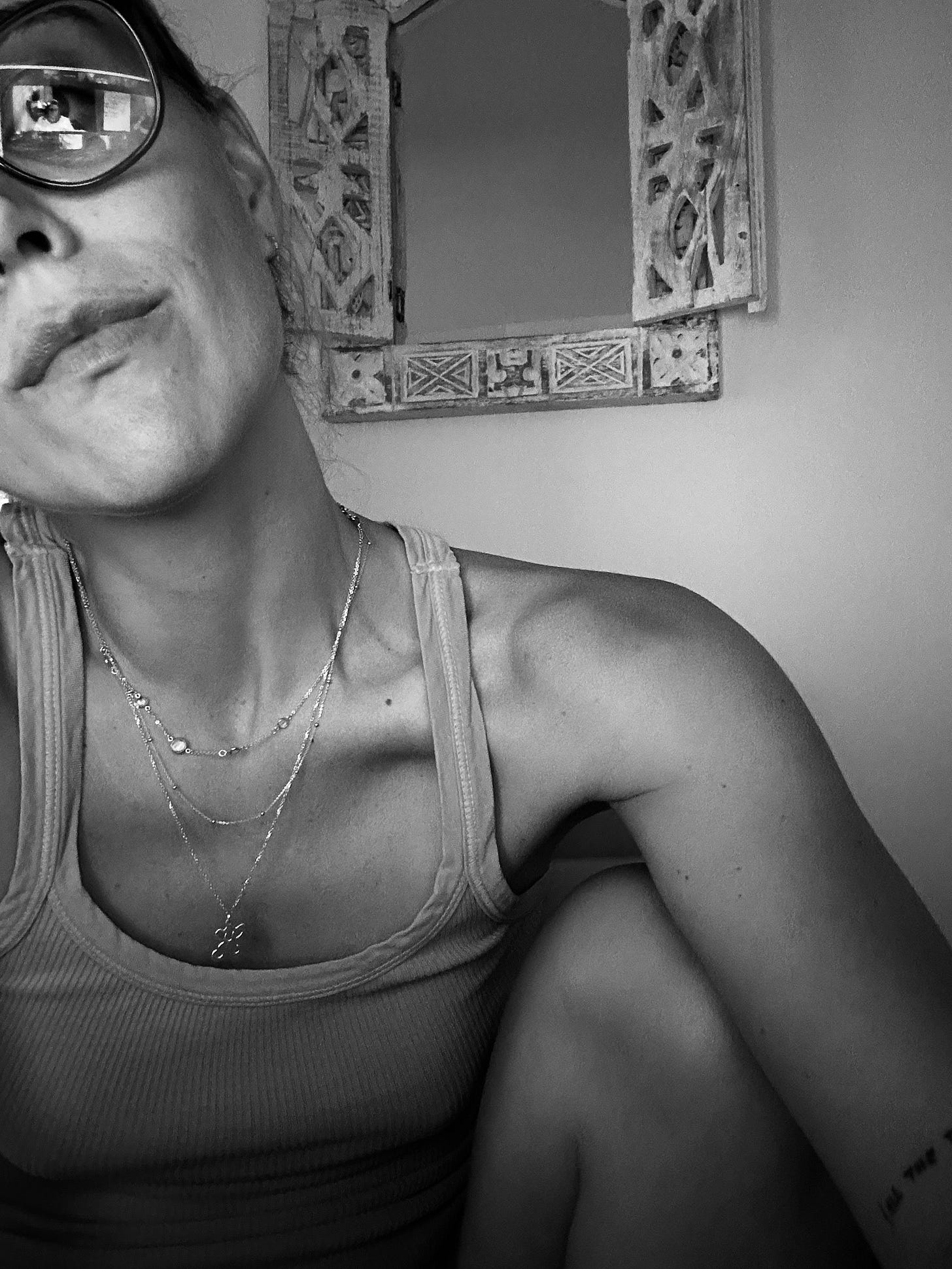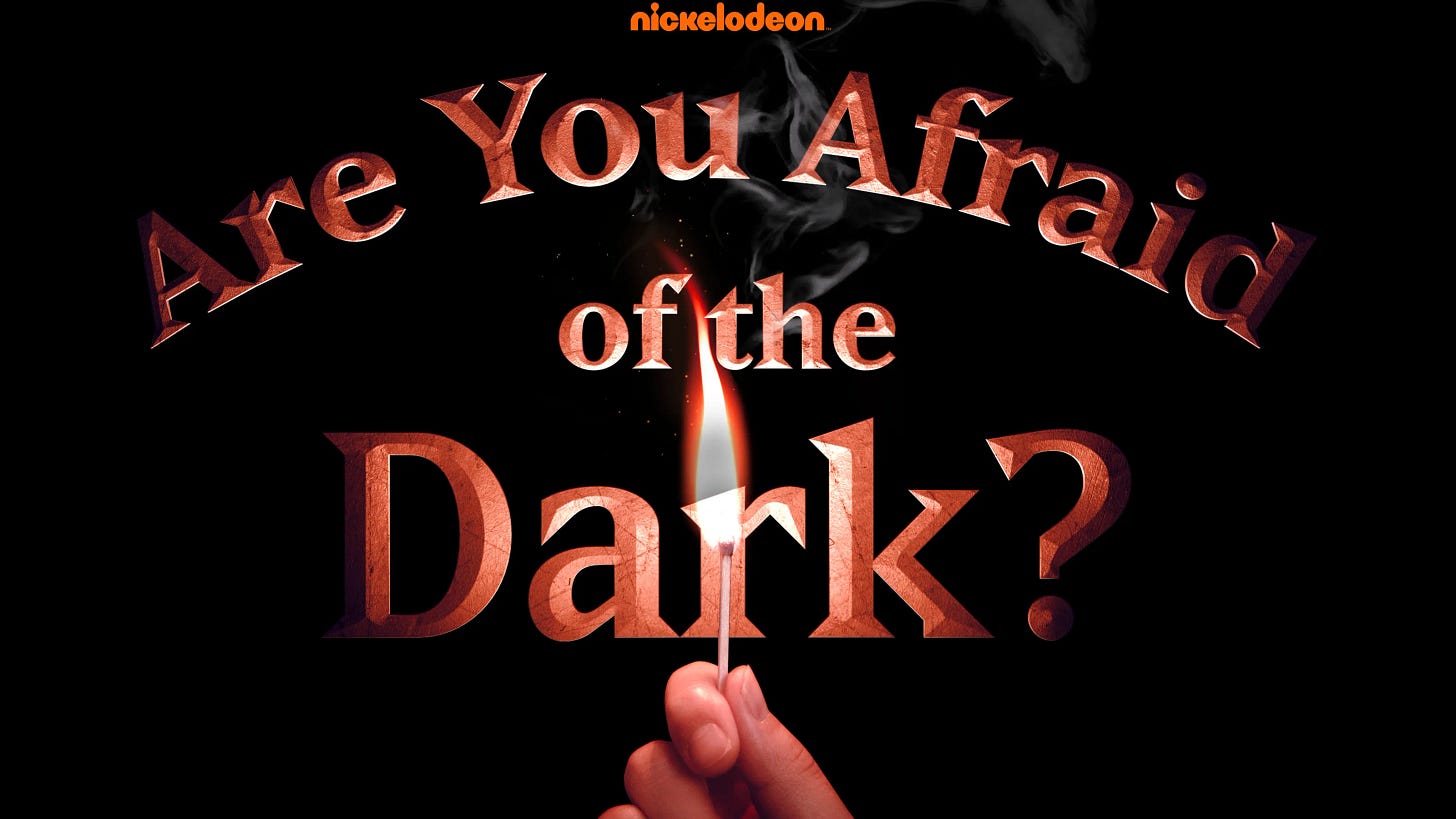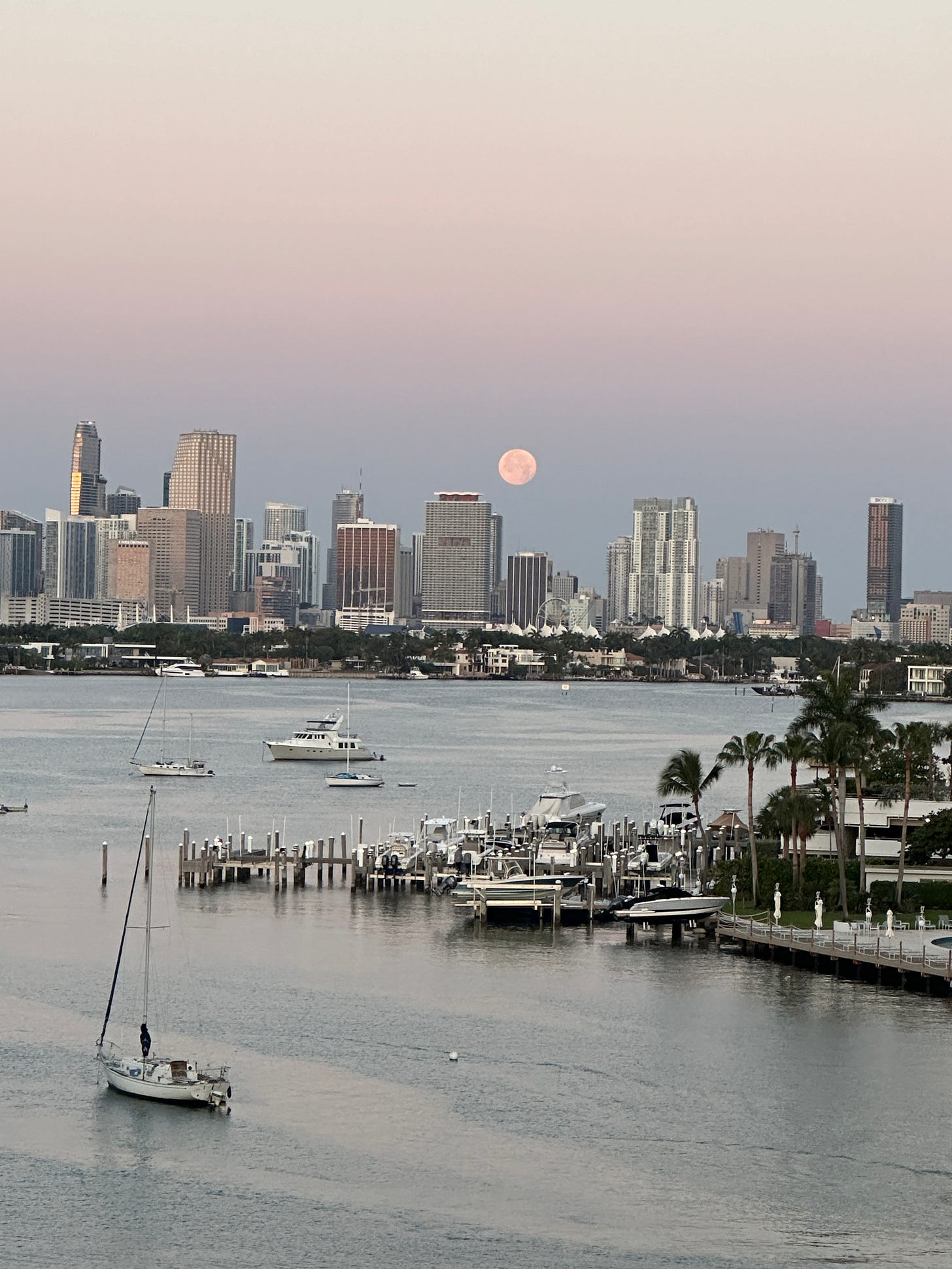🦋Are you afraid of your dark?
In honor of this week’s Full Moon in Scorpio, let's dive into your own darkness and find out what it's telling you about your deepest desires.
The Liminalist is a weekly guide for people who want deeper connections. Hint: it starts with you.
This week I write about welcoming our darkness, because connection is impossible without. Included:
My favorite job interview / 2nd date question.
What integrated darkness looks like in real life.
6 questions I used on the Full Moon to explore my own darkness.
Let’s dive in. 🐇🕳️
I've always been afraid of the dark.
As a kid, I developed tactics to make nighttime easier.
For instance, before going to bed, I checked to see if the shower curtain was open. This way, if I needed to use the bathroom in the middle of the night, there wouldn't be a chance of a boogeyman hiding behind it.
I also scattered clothes across the floor, creating a path to the bathroom. Because as long as my feet didn't directly touch the carpet, I was safe from the monsters under my bed. That’s the agreement we had.
Around the time it would have been "normal" for me to outgrow this fear, I watched a horror film that plunged me into a multi-year struggle with nighttime. Every night I woke up from nightmares begging my mom to let me sleep with her. (Sorry, Mom!)
Living in New York City throughout my twenties only made things worse.
Walking home at night, I was terrified of every person behind me. Clutching my keys between my knuckles. Hearing horror stories from friends of what happened to other women they know.
By the age of 27, I had been burglarized twice, which re-instated the daily routine of checking behind my shower curtain when I got home.
Visibility reduces in the dark, making an environment feel uncertain and unpredictable.
In some cases this can be sexy, like a dimly lit bar on a first date. In others, not so much.
From an evolutionary perspective, fear of darkness was advantageous for survival. A smart way to stay safe. As a woman today, it still is.
Present day media certainly doesn’t help — depicting darkness as the time when bad things happen. If you're a child of the nineties, you probably remember the popular Nickelodeon show Are You Afraid of the Dark.
I did not like this show.
The question of this week is: Are you afraid of YOUR dark?
As we come out of a Full Moon in Scorpio, the sign that carries themes of mystery, secrecy and psychological transformation, I find myself particularly intrigued by the symbolic parallels between our environmental fear of the dark, and the fear we carry of our own psyche’s darkness, and each other’s.
This darkness, or our Shadow, as Carl Jung coined it, contains the parts of our personality that we are afraid of —traits, desires, and impulses that do not align with our conscious self-image—aka who we see ourselves as and hope everyone else does too.
And when we don’t do ‘the work’ to illuminate and integrate our personal shadow, we judge, shun and push away these aspects that we see in others. Instead of learning how to show up for ourselves and meet our own needs, we project these needs onto people around us.
These unrealistic, unmet expectations result is disconnection.
Disconnection from self, therefore disconnection from the people we want to be close to.
This is the real root of loneliness.
It may manifest as constantly rotating friends or lovers, frequently changing jobs, and failing to learn from each relationship or job experience. (it’s ok, your human).
What you want to pay attention to is whether or not you always seem to have a list of reasons why a relationship or job didn't work, with all the blame placed on them, instead of you. ⛳
One of my favorite questions to ask when I'm hiring someone is:
“If I gathered a room full of your past employers and asked them to share your greatest weakness or area of growth, what would they say?”
When I ask this question, I'm looking to gauge their level of self-awareness and honesty.
It’s as a red flag if their response is a weakness that is actually a veiled strength like, “I’ve been told I’m too available,” or “I work too hard.”
A white flag response would be:
“In the past I’ve struggled with boundaries and understanding how to take care of myself while fully showing up to work, and here’s how I’ve improved in this area…”
Feel free to also use this example when you’re starting to date someone new. 😉
There's a misconception in the wellness world, propagated by memes and (uninformed) influencers on social media, that being evolved looks like constant happiness instead of a balanced state of emotional well-being that includes nurturing the full spectrum of feelings and staying regulated as we face life’s challenges.
This is not true.
We call this spiritual bypassing — when someone uses spiritual concepts and practices to sidestep or avoid facing their darkness. If you don’t fall into their trap, it’s easy to spot. They’re the ones preaching a very specific script that isn’t rooted in action or authenticity. Take a closer look and you’ll be able to tell something is off…
I’m sharing this because there’s a real harm in pretending 'we're good' and the isolation that comes from the fear of admitting when we're not.
In reality, the ability to acknowledge our struggles is one of the most beautifully evolved things we can do. Welcome to humanhood.
You want intimacy with others? It happens when you learn to be intimate with yourself, first.
Intimacy with self looks like:
When a trigger arises choosing to calm your nervous system over reacting to the situation.
Setting healthy boundaries with people you are close to.
Sharing your heart with others without expecting anything in return.
Regularly engaging in practices that increase your awareness of your emotions, thoughts, and behaviors— journaling, movement, breathing, etc.
Listening to what your body is telling you, over your mind.
Practicing compassion and kindness to yourself.
Valuing your own company.
This is what integrating with our darkness looks like.
I’ll leave you with a list of questions I created and answered for myself this past week.
My invitation: answer them as honestly as you can, and love every part of yourself along the way.
Make special note of the specific themes that reoccur throughout.
Question to welcome your darkness:
What aspects of myself am I afraid others might find out about me?
What emotions do I find uncomfortable or unacceptable in myself or others?
Are there parts of my past that I feel ashamed of?
How do I typically respond to criticism or feedback?
Are there dreams that I have that I find disturbing or unsettling?
Do I have any unresolved conflicts or unresolved feelings towards certain people or situations?
Your darkness is hot,
Ashley
Hit reply and share your shadow with me. 🖤







